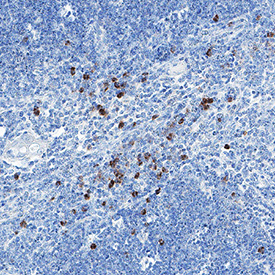Human CD3 delta/CD3d Antibody Summary
Phe22-Ala105
Accession # P04234
Applications
Please Note: Optimal dilutions should be determined by each laboratory for each application. General Protocols are available in the Technical Information section on our website.
Scientific Data
 View Larger
View Larger
Detection of Human CD3 delta/CD3d by Western Blot. Western blot shows lysates of Jurkat human acute T cell leukemia cell line. PVDF membrane was probed with 2 µg/mL of Mouse Anti-Human CD3 delta/CD3d Monoclonal Antibody (Catalog # MAB10672) followed by HRP-conjugated Anti-Mouse IgG Secondary Antibody (HAF018). A specific band was detected for CD3 delta/CD3d at approximately 23 kDa (as indicated). This experiment was conducted under reducing conditions and using Western Blot Buffer Group 1.
 View Larger
View Larger
CD3 delta/CD3d in Human Thymus. CD3 delta/CD3d was detected in immersion fixed paraffin-embedded sections of human thymus using Mouse Anti-Human CD3 delta/CD3d Monoclonal Antibody (Catalog # MAB10672) at 5 µg/mL for 1 hour at room temperature followed by incubation with the Anti-Mouse IgG VisUCyte™ HRP Polymer Antibody (VC001). Before incubation with the primary antibody, tissue was subjected to heat-induced epitope retrieval using Antigen Retrieval Reagent-Basic (CTS013). Tissue was stained using DAB (brown) and counterstained with hematoxylin (blue). Specific staining was localized to cell surface and cytoplasm in lymphocytes. Staining was performed using our protocol for IHC Staining with VisUCyte HRP Polymer Detection Reagents.
Reconstitution Calculator
Preparation and Storage
- 12 months from date of receipt, -20 to -70 °C as supplied.
- 1 month, 2 to 8 °C under sterile conditions after reconstitution.
- 6 months, -20 to -70 °C under sterile conditions after reconstitution.
Background: CD3 delta/CD3d
CD3d, also known as CD3 delta and T3D, is a single-pass type I membrane protein. CD3 delta/CD3d is part of the T-cell receptor/CD3 complex (TCR/CD3 complex) and is involved in T-cell development and signal transduction (1). The encoded membrane protein represents the delta subunit of the CD3 complex, and along with four other CD3 subunits, binds either TCR alpha/beta or TCR gamma/delta to form the TCR/CD3 complex on the surface of T cells (2). CD3 delta/CD3d contains an 84 amino acid extracellular domain, a 21 amino acid transmembrane domain, and a 45 amino acid cytoplasmic domain. Human CD3 delta/CD3d shares 89%, 61%, and 57% sequence identity in its extracellular domain with its cynomolgus monkey, rat, and mouse homologs, respectively. CD3 delta/CD3d, like other subunit members CD3G and CD3E of the TCR-CD3 complex, contains an extracellular Ig domain and a single immunoreceptor tyrosine-based activation motif (3, 4). Defects in CD3 delta/CD3d cause severe combined immunodeficiency autosomal recessive T-cell-negative/B-cell-positive/NK-cell-positive (T-/B+/NK+ SCID) which is a genetically and clinically heterogeneous group of rare congenital disorders characterized by impairment of both humoral and cell-mediated immunity, leukopenia, and low or absent antibody levels (5, 6).
- Gil, J. et al. (2011) J. Clin. Invest. 121:3872.
- Carson, G.R. et al. (1991) J. Biol. Chem. 266:7883.
- Birnbaum, M.E. et al. (2014). Proc. Natl. Acad. Sci. USA. 111:17576.
- Wucherpfennig, K. et al. (2010). Cold Spring Harb Perspect. Biol. 2:a005140.
- Kim, S.T. et al. (2010) J. Immunol. 185:2951.
- Holst, J. et al. (2008) Nat. Immunol. 9:658.
Product Datasheets
FAQs
No product specific FAQs exist for this product, however you may
View all Antibody FAQsReviews for Human CD3 delta/CD3d Antibody
There are currently no reviews for this product. Be the first to review Human CD3 delta/CD3d Antibody and earn rewards!
Have you used Human CD3 delta/CD3d Antibody?
Submit a review and receive an Amazon gift card.
$25/€18/£15/$25CAN/¥75 Yuan/¥2500 Yen for a review with an image
$10/€7/£6/$10 CAD/¥70 Yuan/¥1110 Yen for a review without an image

